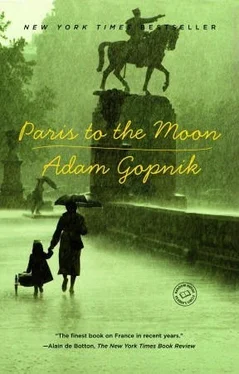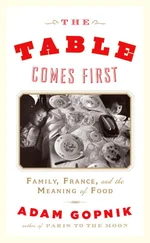The next Wednesday came, and I stopped work early and went to collect the bathing trunks and towels.
“Hey, come on, let’s hustle up,” I said to Luke when he came home after a half day of school. “We have to go to the pool today to meet Ada and Cressida.”
He shrugged. “Daddy, I don’t really feel like going.”
I was dumbfounded, really struck dumb.
“You don’t?” I said at last. “Why not?”
“I just don’t feel like it,” he said, and went into his room to play.
Fifteen minutes later I tried again. “C’mon,” I said, “the sublime Ada and the divine Cressida are expecting us.”
“I just don’t feel like going,” he repeated. Then he looked up at me, a strange half-smile that I had never seen before on his face. “Daddy,” he said, “what will Cressida say if I’m not there?”
“She’ll say she’s sad,” I said, not sure where we were going.
“No, but what will she say exactly. What exactly will she say?”
Then I got it. “I don’t know. I guess, ‘Where’s Luca? I wish Luca were here? I miss Luca so much.’”
“What else?”
“I don’t know. Just like that.”
“No, say exactly what she would say Tell me exactly what she would say.” His face was shining.
“You know.” I groped. “‘I miss Luca. I wish he would come swimming with me.’” I felt vaguely as if I were reciting pornography.
“I’m not going,” he repeated.
The eternal, painful truth of love had struck. Proust wasn’t exaggerating, I realized. Five was fifteen, five slipped into fifteen—or thirty-five, or fifty for that matter, I suppose—seamlessly He was struggling with the oldest romantic-erotic question. Was there more pleasure to be found in sharing Cressida’s company or in feeling the power that he held by making her suffer from his absence? More pleasure to be found in sharing joy or in denying joy, in knowing that he now possessed the power to make her miserable, change her entire emotional state, simply by his absence?
I was already at the door, and was already turning the handle to leave, when he popped out of his room at last.
“OK,” he said, “I’ll go.” I was glad, of course. We went to the pool, and they had a good time, though I noticed that now Cressida, ever so slightly, swam toward him, I bought a lot of hot chocolate, and everybody drank it.
I told Martha the story that night, and she seemed somehow stirred. She wanted to know what Cressida had said, too.
“Well, what exactly did she say?” she said. “What exactly did she say when she saw him?” His absence was alive in her too.
Was it an accident or not that we shared a bottle of champagne, our own chocolat chaud, that night for the first time since she had become big with Olivia, right in the living room, with Tony Bennett singing the English lyrics of our favorite old Michel Legrand song, one of the songs that had gotten us here onto the boulevard Saint-Germain, “You Must Believe in Spring”? Could it have been that her son’s first thrill of sadism with a woman had reawakened her own sense of the fragility of desire, of the urge to renewal that runs through the eternal possibility that Wednesday will come and someone will not be at the pool, no matter how many wet Wednesdays there have been before? I don’t know. There was at least for a moment present again between us the central elements of love: buoyancy, seminudity, and uncertainty, that mixture of imperfect faith and intoxicating drink that is desire.
* * *
Our abonnement was running out that next week. From now on, I knew, we would have to cadge invitations to swim on Wednesday from Cressida and Ada and couldn’t just show up as equals. But I didn’t have the heart, the courage to explain to Luke that we were rubes, just visiting, trespassers of a kind. I just told Luke that we wouldn’t be swimming there anymore. It didn’t seem to bother him any more than our going there together had impressed him. In childhood, I suppose, you are always a little lighter than your circumstances and just keep floating. He worried more about getting his pleasures than about keeping them. He would make me promise him things, in precise order: “First we’ll go to the pool, then we’ll have hot chocolate, then we’ll have dinner, then we’ll play a game, then we’ll have the Rookie story….” He knew that if he didn’t get a contract written down in advance, you could lose any part of it, and that worried him. On the other hand, he didn’t worry that the pleasures would ever run out. Life was full of good stuff. The budget of pleasures is tighter in childhood, but the economy of pleasure at least is always in surplus.
We had one last thing to do, of course. We had tried to kiss the mermaid so many times, and we had always failed, because he was too short and I was too scared.
“Let’s just touch the mermaid,” he said wisely, this time, and we held our breaths together, and then we did.
When we were getting ready to leave Paris, I found several hundred shower caps, pristine in their gold and blue boxes, hidden in his bottom drawer.
Paris won the century, against all odds. At least we won the party, which is the next best thing to dominating the period. In London they had built a giant wheel and a giant dome and a great big rhetoric of newness to greet the next thousand years. In New York, unduly jumpy despite all the money and power, our friends’ major millennial ambition seemed to be to keep out of midtown. One couple we knew had decided to drive down from the country, where they were hunkering down in Y2K alert, park on Ninety-sixth Street, go to a midtown party, and then get back in the car and get home, before the lightning struck, keeping Times Square at a safe and wary distance.
But that was New York, where everything was happening anyway, one millennial party more or less hardly mattered, everybody there was probably on to the next millennium anyway. London was more annoying. We would arrive at Waterloo Station on the Eurostar—transplanted Americans, of course, but still patriotic Parisians—and feel vaguely ashamed, cheesed off, even sort of country cousinish. Where did London come by this feeling of confidence, this sense of entitlement, all this girder and vinyl construction? My cousin Philippe, who had once wandered with me through the outer arrondissements of Paris in search of von Stroheim festivals and Dominique Sanda memorabilia, had moved to London now too and was dropping me E-mails about the progress of his fish restaurant, disparaging the provincial cooking in the country he had left behind.
Yet on the night, Paris shone, scored a clear and beautiful triumph. It had, to be sure, been a weird run-up through Christmas week. A siege of flu had struck Europe. It hit our family right in the kisser. Everyone was sick. I had been banished to the sofa, in fear that my flu would spread to the baby (It did anyway) I shook with the chills on the sofa all night, only to find a fevered Luke sympathetically jumping in every night alongside me. (Sympathetic? Or just so satisfied by the idea that Daddy had at last been banished from the marriage bed that he wanted to make sure that he didn’t stray back?) Anyway, there is nothing so strangely comforting in sickness as the feeling of an all-elbows-and-knees five-year-old with a 103 fever, shaking alongside you on a narrow velvet sofa.
It was Christmas Eve by the time we had all recovered, and Martha and I had to crowd all our shopping into that single day, rushing from Au Nain Bleu for a two-wheeler with training wheels for Luke up to Bonpoint for a sea green tulle first dress for Olivia, and then quickly into line at Laduree for our bucize de Noel. (We actually got summoned out of line, as people who had wisely ordered in advance, and got our buche from an efficient but unprepossessing-looking Laduree bakery truck, parked at the curb on the rue Royale.) Parisians are efficient Christmas shoppers, I suppose, or maybe everybody else was home sick with the flu. Anyway, the rue Royale was pretty much empty by five o’clock, and Martha and I, walking out into the pure violet and gray light of the place de la Concorde at twilight in December, had it to ourselves. The Concorde at Christmas at five o’clock has as many subtly distinguished shades of gray as a pair of flannel pants painted by Manet.
Читать дальше












